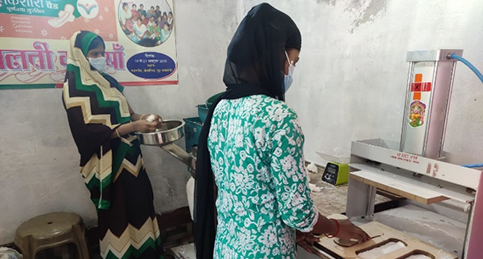At the start, the Foundation considered different manufacturing technologies, machines, and processes involved. The final choice was made among those machines/technology which also did not require too much/continuous electricity, could generate employment opportunities and which had the potential to be operated and run by women of the villages.

The foundation examined and considered various manufacturing technologies and processes developed by different vendors/entrepreneurs across India. Machines and technologies from six different vendors were considered. These were: 1. Society for Rural Industrialization (SRI), Ranchi, Jharkhand; 2. Jayshree Industries, Coimbator, Tamilnadu; 3. Shehnaz Enterprises, Udaipur, Rajasthan; 4. Aakar Innovations (Anandi Pad), Mumbai, Maharastra; 5. Red Cross Kutir Udyog, Vrindavan, Uttar Pradesh; and 6. Rag Innovations, Bhopal, Madhya Pradesh.
(New packet design of the Kishoree Pad)

After thorough examination and consideration, a decision was taken to install the semi-automatic machine manufactured by Shehnaz Enterprises, Udaipur (this is owned by a young engineer entrepreneur, Mr. Abdul Kadir). While selecting the technology and settling for the semi-automatic process, the Foundation’s idea of providing livelihood opportunities to local women was an important factor. The first manufacturing unit was established in Nayagaon village in the space available in the trustee’s property. In the beginning, manufacturing started with installation of machines which manufactured sanitary pads of large size (260-270 mm). The initial experience of distributing the pads and raising awareness among the local women and girls hinted that there was also a demand for smaller size sanitary pads, especially among younger and adolescent girls, who were finding the larger sized pads slightly uncomfortable and inefficient.
Thereafter, addition manufacturing facility was setup to produce small pads of 230 mm also. A three-die unit was installed to increase the speed of manufacturing. These were installed and have since been working together. A further expansion of Nayagaon unit has also been undertaken after a year of operation and with the installation of second manufacturing unit at Nayagaon, its capacity and scale has increased.

In the beginning, the running cost, or production and distribution cost of pads was difficult to estimate correctly. Though there have been different ways of estimating raw material cost for each pad, and it was reasonably done too, estimating administrative, labour and distribution cost proved much more challenging.
After many months of operations, the foundation has worked out its cost of production, though that is still not very precise as there are many variable factors which do affect the cost of production. Nevertheless, the cost of production of each packet of Kishoree pad (which contains 6 pads) comes in the range of Rs. 25 to Rs. 30. Out of this around half is labour cost and rest is raw material and overhead cost.
Kishoree Foundation © 2019, All Rights Reserved.